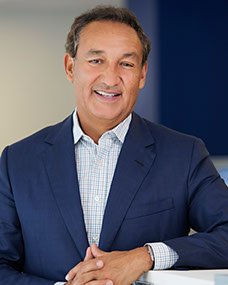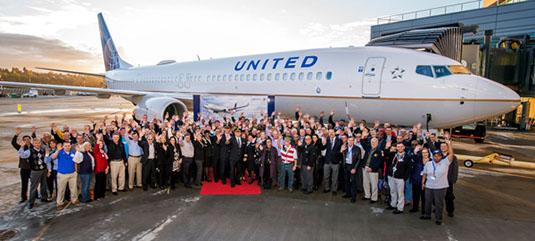
Paying it Forward
At United Airlines, diversity is not just something to strive for, it’s embedded in the company culture. This starts at the top, with Oscar Munoz at the helm--one of only a few Latino CEOs in the Fortune 500.
But Munoz isn’t the only Latino in the C-suite, with several others holding key positions at the company, including Vania Wit, Vice President and Deputy General Counsel in United’s Legal Department. Wit’s responsibilities include litigation and legal compliance, anti-trust, labor employment and benefits, and legal administration. The daughter of Bolivian immigrants, Wit grew up in a Chicago suburb, graduating from Northwestern University and Harvard Law School. Before arriving at United 18 years ago, she worked for a law firm in Chicago and specialized in labor law. She came to United the real old-fashioned way, through a newspaper ad, and hasn’t looked back since.
administration. The daughter of Bolivian immigrants, Wit grew up in a Chicago suburb, graduating from Northwestern University and Harvard Law School. Before arriving at United 18 years ago, she worked for a law firm in Chicago and specialized in labor law. She came to United the real old-fashioned way, through a newspaper ad, and hasn’t looked back since.
“United is a very supportive environment. As a Latina, I feel that I have been fortunate to have a company that really takes diversity and inclusion to heart, as well as developing its employees, and trying to really ensure that we have a diverse leadership team,” Wit said. “What’s nice about the company is that it has a worldwide footprint and you meet people with so many different experiences. That really ensures that you’ve got a broad network and you’re able to connect with people from different backgrounds.”
Wit believes that mentoring is an important part of her work at United, and calls it a way of paying it forward: “Through the work that I’ve done, I’ve been able to work with a lot of people across the company in many different levels. I have worked very hard to make sure that our newer attorneys get to know the company well and interface with others and that they get projects that will broaden their horizons.”
The advice she would offer young Latinos entering the corporate world is to never be afraid to take on responsibility and look at every interaction as an opportunity to make a good impression, while always staying positive: “You may get hired to take on a role that has a specific focus and I would view that as a launching pad. Don’t turn away a task no matter how limiting it may seem. It’s building on your credibility, and that takes time. Always push yourself and never be afraid of missteps because you learn the most from making mistakes.” Even when social media is so prevalent, face-to-face contact whenever possible is good, Wit says. “It’s always best to have that contact, attend meetings in person, work on your network. I see a lot of what makes successful leaders and it’s knowing when to push yourself and when to put yourself out there.”
Among its diversity and inclusion initiatives, United has several Business Resource Groups that reach out to its employees of various backgrounds, such as the multicultural UNITE that brings in speakers and hosts networking events. “Those groups and the company’s overall mission mean that the company is really working to make diversity and inclusion in what we do and how we do our work,” says Wit. “I’ve always felt very supported and encouraged to be out there and be mentoring and make connections, and doing speaker engagements whenever possible, so I’ve got a nice platform to be a role model when possible.”
 For Hermes Pineda, Managing Director, Human Resources and Employee Relations - Field Operations, diversity has been part of his work from the very beginning. Pineda joined Continental (which merged with United in 2010) in 1987 as an hourly employee while going to college full time, and continuing while he went to law school. “The airline is so diverse and it’s a real reflection of the community. I never felt out of place, it just feels normal. I started at a low level and was given the opportunity to not only do the things that I needed to do to improve myself, but also to grow,” says Pineda, adding that people are approachable and mentoring is a big part of the culture at the airline. “In the beginning when I would ask for advice, I expected people to say I don’t have time to meet with you, but actually the opposite happened. They were more than happy to meet with me and I’ve been blessed and lucky that I asked for feedback and advice and got it. I consider that a form of mentoring.”
For Hermes Pineda, Managing Director, Human Resources and Employee Relations - Field Operations, diversity has been part of his work from the very beginning. Pineda joined Continental (which merged with United in 2010) in 1987 as an hourly employee while going to college full time, and continuing while he went to law school. “The airline is so diverse and it’s a real reflection of the community. I never felt out of place, it just feels normal. I started at a low level and was given the opportunity to not only do the things that I needed to do to improve myself, but also to grow,” says Pineda, adding that people are approachable and mentoring is a big part of the culture at the airline. “In the beginning when I would ask for advice, I expected people to say I don’t have time to meet with you, but actually the opposite happened. They were more than happy to meet with me and I’ve been blessed and lucky that I asked for feedback and advice and got it. I consider that a form of mentoring.”
Pineda says that in addition to Business Resource Groups, the company has rolled out a mentoring program to match mentors with mentees and create lasting relationships among employees. Part of his role is to consider the employees as his customers. “It’s critical to listen to them and give them what they want and ensuring that we are giving the employees the tools to succeed,” he says. “Right now with all the things that are happening, we are very much a reinvigorated company, laser-focused on our customers and our employees.”
Pineda was born in Cuba and left as a youngster with his parents and three brothers in 1970, first stopping in Spain for a couple of years while they waited for their visas to the U.S. “My parents are the biggest influences in my life. They have always preached to me to work hard and behave in the right way and never undersell yourself and never settle, to be the best you can be. They worked hard, my father was a machinist and my mother was a seamstress, and they embraced the American Dream and are an inspiration to me and my brothers.” Pineda says he thinks about that when he talks to young people already in the company or thinking of joining the corporate world, and advises: “Do a good self-evaluation and understand what kind of shadow you cast on other people. When people see you, what do they see in you? Create your own brand and manage that brand carefully, and learn from your mistakes, and don’t be afraid to ask for advice. Leaders are always looking for the next wave of leaders, so don’t be afraid to participate in networking. Get to know some of the officers and to go to events to meet people and introduce yourself.”
Sylvia Gómez, Director, IT Planning and Chief of Staff to the Chief Digital Officer, has been with United from the very beginning of her career 28 years ago. A native of Chicago, she spent several years as a young girl living in Mexico City with her family when her father was transferred there, and Gómez says it was a good way to reconnect with the culture: “It was a really good opportunity for us to be part of the culture, learn the traditions, and speak the language. Instead of being different, we learned what is was like to be Mexican in Mexico City.”
Gómez returned to the Chicago area, eventually earning a bachelors degree and MBA from Elmhurst College. She recalls that while she started with United in the finance department, she’s been able to work in many different departments: “United is a very big company, and I’ve been very fortunate to have many careers within the same company. I’ve had many jobs, many opportunities here. In a very big company you have the opportunity to play many different roles. Look at me, I have an industrial psychology degree and I worked in finance, and I don’t have a technical background and I work in IT, and I love what I do. I’ve always been very fortunate as a woman and as a Latina to have people that have mentored me throughout the years. It’s never done alone. There’s people who support you, who guide you, and even stop you when you’re about to make a mistake or go down the wrong path. There are people that I have relied on over the years.”
Gómez concludes that as a Latina, she has felt very welcome at United, and also believes in paying it forward: “Diversity is highly encouraged. We have trainings, we have opportunities to make diverse hires. We have both informal and formal mentorship programs, and I’m involved in both. Informally it’s people I meet, and formally, we have interns that I mentor. I always feel that at the beginning of their career they need a little bit more guidance in help with the decisions they’re making, whether it be professional development or personal.”
By Patricia Guadalupe
Randy Falco
Lourdes Diaz